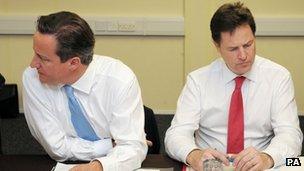Analysis: What does ditching Lords reform mean for the coalition?
- Published

Nick Clegg insists his working relationship with David Cameron is still good
The rules have changed.
Senior aides to the deputy prime minister say the failure to deliver Lords reform was an "unprecedented event", so they are killing off boundary changes in return.
There's now a definite air of tit-for-tat around the coalition.
Others in the Clegg circle have dismissed the claim that Tories and Liberal Democrats could now try to blackmail each other over remaining parts of the coalition agreement.
It's not a "zero sum game", they say, as the partnership looks to move on from this failure to deliver.
But it's clear that the junior partner has fired a shot across the bow to deny the senior partner something it wants.
Vengeful or strategic?
Assertive Clegg? Vengeful Clegg? Both maybe.
You could see it as Strategic Clegg, who has accepted the reality of no coalition consensus, and pulled the plug on it, thus sparing a fractious fight and a near sclerotic legislative battle.
Up until two weeks ago the deputy prime minister was offering a considerable compromise: Referendum on Lords reform then staggered introduction of the reforms, if approved.
But sources say it became clear then that the prime minister could not deliver Tory votes. The deal was rejected by Jesse Norman and some of the 90 other rebels he represented.
I was told the choreography was still being discussed yesterday, with a final call between Mr Cameron and Mr Clegg to agree on the consequences.
No Lords reform equals no boundary changes before 2015. But the two don't agree it is a quid pro quo.
The Tories want to push ahead with the boundary review legislation, even though Nick Clegg said his MPs would oppose it. That means the prospect of ministers voting against government policy.
Those around the Lib Dem leader say one side has failed to deliver on the coalition agreement, for the first time, and "you can't have that". There has to be a consequence and when one side fails to honour a contract "you renegotiate", they said.
That type of language is what fuels the view that other parts of the deal are now up for grabs.
Mid-term review
We know that a mid-term report is on the way. Both Cameron and Clegg spoke of assessing what they'd done and what they planned to do once they return from the summer break.
It may end up being viewed as a far more fluid document than the one which emerged after those days of intense talks in May 2010.
Some Tories, admittedly not the biggest fans of the coalition arrangement, have already questioned Nick Clegg's trustworthiness in light of this move.
Stewart Jackson went as far as accusing him of lying about the link between achieving Lords reform and securing boundary changes.
The two men at the top seem to be on good terms though. Nick Clegg told the BBC things were "fine, thank you very much" between him and the prime minister.
The personal dynamic remains important if the marriage is to continue. But the rules have changed.
- Published6 August 2012
- Published6 August 2012
- Published6 August 2012